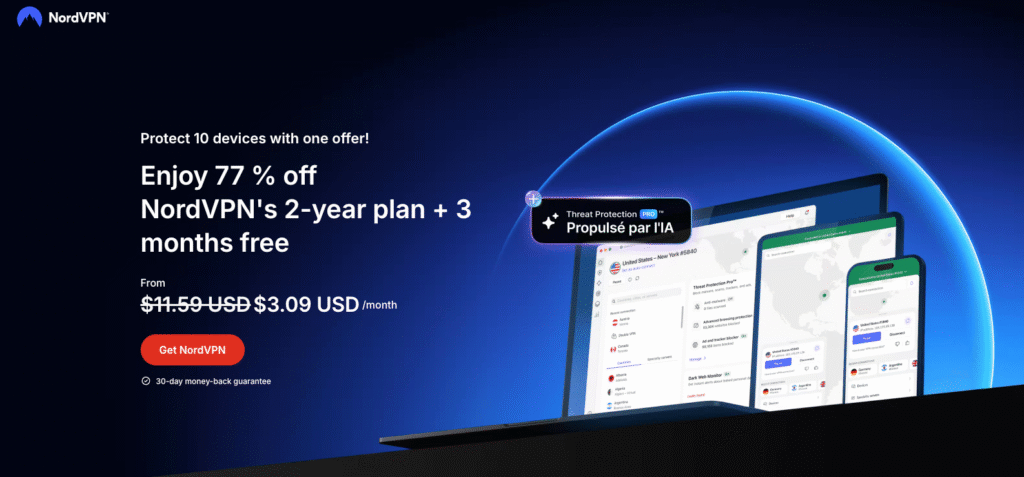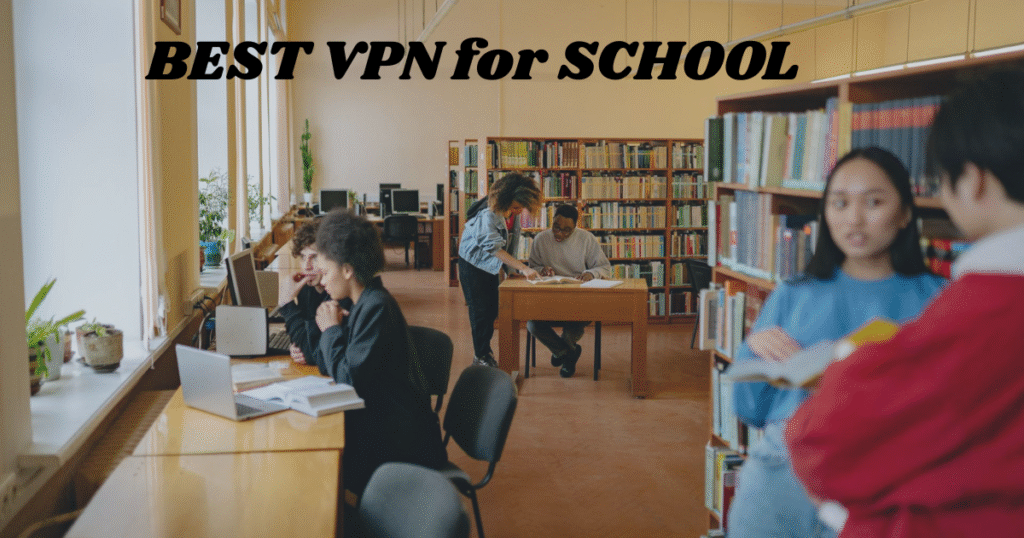Tired of restrictions on your school or work Wi-Fi? Discover why NordVPN is the best VPN for school and workplace networks in 2025. Learn how VPNs bypass blocks, protect your data, and keep your browsing private.
This post contains affiliate links. If you purchase through these links, I/we may earn a commission at no extra cost to you.
Table of Contents
Introduction: Why Wi-Fi Restrictions Are a Real Problem
Have you ever sat in a classroom, library, or office, tried to open YouTube or Spotify, and been greeted by a “This site is blocked” message? It’s a frustrating reality for students and professionals alike. Both schools and workplaces often limit internet access to encourage productivity or maintain network security.
The problem is that these restrictions can block legitimate sites you need for studying, working, or even relaxing during a break. Think of it as going to a gym but being told you can’t use half the equipment. That’s where a VPN (Virtual Private Network) comes in.
In this article, I’ll explain why a VPN is essential for both students and workers, why I personally recommend NordVPN as the best VPN for school and professional use, and how it compares to other top services. I’ll also share practical tips for installing a VPN on restricted networks, whether you’re at school, work, or using public Wi-Fi at a coffee shop.
What Is a VPN and Why Does It Matter?
A VPN is like a secure tunnel for your internet traffic. Normally, when you connect to Wi-Fi, all your browsing flows directly through the school’s or company’s network. That means they can monitor your activity, block certain sites, or even throttle your speeds.
When you use a VPN:
- Your traffic is encrypted, so nobody—not your school’s IT team, not your office administrator, not even hackers on public Wi-Fi—can see what you’re doing.
- Your location is masked. To websites, it looks like you’re connecting from a different place.
- You can bypass restrictions by connecting to servers outside the school or office firewall.
💡 Real-World Analogy: Imagine you’re whispering a secret message to a friend in class. Without a VPN, the teacher overhears every word. With a VPN, you’re speaking in a private language only your friend understands.
This makes VPNs valuable not just for entertainment, but also for protecting sensitive information like passwords, research data, or client files.
Why Restrictions Exist at School and Work
It’s important to understand why institutions put these barriers in place:
- Schools: To reduce distractions (blocking social media, games, and video platforms).
- Workplaces: To maintain productivity and protect against data leaks or malware.
- Public Spaces: To limit bandwidth usage (for example, stopping people from streaming in coffee shops).
These restrictions are often well-intentioned, but they can be overly strict. For example:
- A student researching a social media case study might not access Facebook on the campus Wi-Fi.
- An employee testing a client’s website could find it’s on the company’s restricted list.
- A remote worker in a hotel might struggle with blocked video-conferencing apps.
In these cases, a VPN isn’t about breaking rules—it’s about regaining access to the resources you need.

Why NordVPN Is the Best VPN for School and Work
After testing multiple providers, I found that NordVPN strikes the best balance between speed, security, and usability. Here’s why:
1. Strong Firewall Bypass Capabilities
NordVPN uses obfuscated servers, which disguise VPN traffic as regular internet traffic. This makes it one of the few VPNs that consistently bypasses school firewalls and workplace filters.
2. Blazing-Fast Speeds
One of the common fears about VPNs is slowing down your connection. In my experience, NordVPN barely affects speed. I could stream HD video and join Zoom calls without lag. Independent tests confirm that NordVPN only reduces speeds by a small margin—sometimes less than 5%.
3. Robust Security
NordVPN uses AES-256 encryption (often called “military-grade”). This ensures that whether you’re entering school credentials or sending confidential office files, your data is safe. It also has a kill switch—if your VPN drops, the internet connection cuts automatically, preventing leaks.
4. Multi-Device Support
With up to 10 devices per account, NordVPN covers your laptop, phone, and even work tablet under one subscription.
5. Affordable Pricing and Student Discounts
Through Student Beans, NordVPN offers discounts of up to 75%, bringing costs as low as $3 per month. For professionals, long-term plans are still cheaper than daily coffee runs.
Alternatives Worth Considering
While NordVPN is my top choice, a few other VPNs deserve mention:
- Surfshark: Unlimited device connections and strong streaming support. Great for families or teams.
- Proton VPN: Offers a free tier with unlimited data. Ideal for testing VPNs without paying upfront.
- CyberGhost: Extremely beginner-friendly, with specialized servers for gaming and streaming.
- Private Internet Access (PIA): Known for transparency and customizable privacy features.
- IPVanish: Excellent speeds for gaming and video calls, though no student discount.
Practical Use Cases for Students and Professionals
- Students: Access restricted websites (YouTube, Reddit), unblock educational resources, and keep browsing private from school admins.
- Employees: Bypass overly strict corporate filters, protect sensitive work data, and ensure safe browsing on office or hotel Wi-Fi.
- Remote Workers: Stay connected securely in coworking spaces or public hotspots.
- Freelancers: Manage multiple accounts without being flagged for using the same IP.
💡 Example: I once worked from a hotel where the Wi-Fi blocked Zoom. With NordVPN, I connected to a nearby server and joined my client call without a hitch.
Step-by-Step Guide: Setting Up a VPN
- Choose your VPN (NordVPN recommended).
- Download the app on your device (Windows, macOS, iOS, Android, or Chromebook).
- Log in and connect to a server outside your school or office network.
- Enable kill switch for extra protection.
- Enjoy unrestricted, secure browsing.
For Chromebooks, you can install the VPN app from Google Play or use a browser extension. On locked-down devices, sometimes using your phone as a hotspot with the VPN active works as a workaround.
Is It Legal to Use a VPN at School or Work?
Yes—VPNs are legal in most countries. However, institutions may have policies restricting them. The key is responsible use. Don’t use a VPN to break laws or violate contracts. For most users, VPNs are tools for security, not mischief.
FAQs: Best VPN for School and Work
1. What’s the best VPN for school Wi-Fi?
NordVPN is the best VPN for school thanks to its obfuscation technology, fast speeds, and student discounts.
2. Can I use a VPN at work without getting caught?
Yes, but check your workplace policy. VPN traffic is encrypted, so admins can’t see your activity, but they might detect VPN usage.
3. Will a VPN slow down my connection?
Slightly, but top providers like NordVPN and Surfshark are optimized for speed. Most users won’t notice the difference.
4. Are free VPNs safe?
Not always. Free VPNs often sell data or have limited servers. Proton VPN is one of the few safe free options.
5. Can a VPN protect me on public Wi-Fi?
Absolutely. VPNs encrypt your data, preventing hackers from intercepting passwords or messages.
Conclusion: Unlock Your Internet, Protect Your Privacy
Whether you’re a student trying to stream a lecture replay or a professional accessing blocked tools at work, the right VPN can save you frustration and keep you safe.
For me, the clear winner is NordVPN. It bypasses restrictions, maintains speed, and protects privacy—all at a student-friendly price.



Pingback: Why We All Need Great Webcam Software Today - LGM4